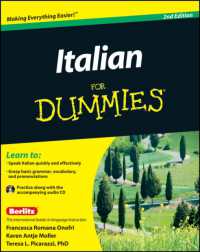- ホーム
- > 洋書
- > 英文書
- > Philosophy
Full Description
This is an open access title available under the terms of a CC BY-NC-ND 4.0 International licence. It is free to read on Oxford Academic and offered as a free PDF download from OUP and selected open access locations.
This is a broad and authoritative study of one of the central topics in the study of the mind: the origins of concepts. The authors survey the debate between rationalists and empiricists which stretches back to the very beginnings of philosophy, and has been at the centre of some of the most exciting research in cognitive science. Many have charged that the debate is riddled with confusion or that rationalist approaches, in particular, are deeply problematic. The Building Blocks of Thought offers a comprehensive rethinking of the foundations of this debate, showing that these negative appraisals are based on misunderstandings. Stephen Laurence and Eric Margolis argue that the debate should be understood to concern the nature of the unlearned psychological traits that provide the foundation for learning all concepts. They go on to argue for a version of concept nativism according to which there is a rationalist account of the origins of many concepts across many different conceptual domains. This rationalist view is developed around seven distinct arguments, drawing on a wealth of data across the cognitive sciences, which are shown to come together to form a unified large-scale argument to the best explanation for a rationalist account of the origins of concepts. Rounding out the case for concept nativism, the book contrasts this view with the most important and influential empiricist views, as well as alternative rationalist views, including Fodor's infamous radical concept nativism and his claim that concept learning is impossible. The Building Blocks of Thought argues for the enormous importance of learning and culture, showing how a thoroughly rationalist approach facilitates and enhances cultural learning and provides the foundations for the best overall account of the origins of concepts.
Contents
1: Introduction: Whatever Happened to the Debate Over Innate Ideas?
PART I: The Rationalism-Empiricism Debate
2: What the Rationalism-Empiricism Debate is Really About
3: Why the Rationalism-Empiricism Debate Isn't the Nature-Nurture Debate
4: The Viability of Rationalism
5: Abstraction and the Allure of Illusory Explanation
6: Concepts, Innateness, and Why Concept Nativism is about More Than Just Innate Concepts
7: Conclusion to Part I
PART II: Seven Arguments for Concept Nativism
8: The Argument from Early Development (1)
9: The Argument from Early Development (2)
10: The Argument from Animals
11: The Argument from Universality
12: The Argument from Initial Representational Access
13: The Argument from Neural Wiring
14: The Argument from Prepared Learning
15: The Argument from Cognitive and Behavioural Quirks
16: Conclusion to Part II
PART III. Alternative Empiricist Perspectives
17: Methodological Empiricism
18: Neo-Associationism
19: Artificial Neural Networks: From Connectionism to Deep Learning
20: Neuroconstructivism
21: Perceptual Meaning Analysis
22: Embodied Cognition
23: Conclusion to Part III
PART IV. Fodorian Concept Nativism
24: The Evolution of Fodor's Case Against Concept Learning
25: Not All Concepts Are Innate
26: Fodor's Biological Account of Concept AcquisitionDLand the Importance of Cultural Learning
27: Conclusion to Part IV
28: Coda: Innate Ideas Revisited








